Enhanced Geothermal System Market Research, 2032
The global enhanced geothermal system market was valued at $2.0 billion in 2022, and is projected to reach $3.3 billion by 2032, growing at a CAGR of 5.2% from 2023 to 2032.

An enhanced geothermal system (EGS) is a geothermal energy technology that uses heat from the core of the Earth to produce power. EGS constructs an artificial geothermal reservoir by injecting water into hot, dry rock formations deep under the crust of the Earth, in contrast to conventional geothermal systems, which rely on naturally occurring pockets of steam and hot water. The water is then heated by the nearby rocks and transported back to the surface where it condenses into steam, which drives turbines to generate electricity. EGS technology uses a range of techniques, including hydraulic fracturing (fracking) to make cracks in the rocks for water circulation, fluid injection to improve heat exchange, and effective steam extraction for power generation. It provides a consistent and long-lasting source of renewable energy with low greenhouse gas emissions.
The surge in the demand for clean energy drives the growth of the enhanced geothermal system market industry. EGS is regarded as a clean energy option owing to its negligible adverse impacts on the environment and its capacity to deliver dependable and sustainable power without producing significant greenhouse gas emissions. EGS produces electricity without fossil fuels. It does not involve combustion, as compared to traditional energy sources such as coal, oil, and natural gas, which release significant volumes of carbon dioxide and other pollutants when burned to produce electricity. Instead, it draws heat directly from the crust of the Earth, reducing the release of hazardous greenhouse gases that fuel climate change.
In addition, there is no air pollution produced by the EGS process. Regular pollution and particulate matter emissions from conventional power plants contribute to poor air quality and health problems. EGS power plants, on the other hand, do not emit these pollutants, which improves the air quality and lowers health risks for the residents around. EGS is also capable of supplying baseload electricity. It provides power regularly as the heat of the Earth is always available, contrary to intermittent renewable sources such as solar and wind, which are reliant on the weather. This dependability supports the security of the energy grid and the continuity of the power supply.
Enhanced geothermal systems are a sustainable energy source that produces electricity without harming the environment and contributing to greenhouse gas emissions. Their stability and continuous power output further enhance their appeal as a sustainable energy source that helps create a cleaner and greener future leading to the expansion of the market.
High consumption of electricity is another factor that drives the growth of the enhanced geothermal system market. The increased focus to develop geothermal systems has been influenced by a rise in need for electricity globally as nations progressively switch to cleaner, renewable energy sources, with geothermal power being one of their options. Geothermal reservoirs may supply energy for extended periods, ranging from decades to centuries, with correct management. This long-term sustainability is in line with the requirement for a constant and dependable electrical supply as civilizations continue to evolve and develop.
The capacity of geothermal power plants to provide baseload power is widely recognized. This is extremely important because of the ongoing demand for power brought on by urbanization and industry, and as the steady supply of geothermal energy is essential to preserving system stability.
Furthermore, the need to maintain grid stability grows as daily variations in electricity usage get increasingly noticeable. The consistent output of geothermal energy may help to balance out the irregular generation from other renewable energy sources such as solar and wind, reducing the need for energy storage technologies and ensuring a constant and uninterrupted electricity supply. Owing to these factors, the rise in the demand for electricity is expected to stimulate the growth of the enhanced geothermal system market forecast.
The investment cost of enhanced geothermal systems is high owing to several factors, including the complexity of the technology, the drilling and construction processes, and the initial development of geothermal reservoirs, that restrains the market growth. EGS requires drilling a lot to reach deep rock strata where heat may be extracted. Deep well drilling demands precision and efficiency, which are technically challenging activities that involve specialist equipment, experienced staff, and engineering expertise. The upfront costs are higher due to complexity.
Infrastructure investments such as well construction, fluid injection systems, and surface facilities are necessary to construct an artificial geothermal reservoir through fluid injection and circulation. Hydraulic fracturing, a common element of EGS, is used to fracture the rock formations, which facilitates fluid circulation and heat exchange. The specialist equipment, materials, and engineering required for safe and effective fracturing may make the process expensive.
Furthermore, EGS has low operating expenses once it starts operating, but the initial investment costs take time to pay off. Some investors who want to see profits sooner may be put off by this longer payback period. Owing to these factors, the high investment costs hinder the growth of the market.
Rise in construction activities presented an excellent growth opportunity for the enhanced geothermal system market. The construction sector utilizes enhanced geothermal systems to produce power, heat structures, cool buildings, and carry out a variety of other construction-related tasks in an effective and sustainable manner. EGS supports more ecologically responsible building practices while potentially lowering operational costs for building owners and operators by reducing energy usage, greenhouse gas emissions, and dependency on fossil fuels.
Buildings may have geothermal heat pumps installed for space heating and cooling. These systems make use of the constant temperature of the sub surface of Earth to heat and cool buildings. EGS improves the efficiency of these systems and lowers the energy needed for heating and cooling by increasing the available heat exchange surface and enabling higher temperature differentials.
Moreover, district heating systems, that distribute heat produced from a centralized source to many buildings, benefit from the use of EGS. It produces hot water that is used to heat buildings such as homes, workplaces, and other localized structures, which eliminates the need for separate heating systems in each one. Owing to these factors, the surge in construction activities boosted market growth.
The enhanced geothermal system market is divided by resource type, depth, simulation method, end use, and region. On the basis of resource type, the market is classified into hot dry rock, sedimentary basin, radiogenic, and molten magma. On the basis of depth, the market is bifurcated into shallow and deep. On the basis of simulation method, the market is segregated into hydraulic, chemical, and thermal. On the basis of end use, the market is bifurcated into residential and commercial. On the basis of region, the market is analyzed across North America, Europe, Asia-Pacific and LAMEA.
The key players operating in the global enhanced geothermal system are Aboitiz Power Corporation, AltaRock Energy, Inc., Calpine Corporation, Enel Spa, First Gen, Fuji Electric Co., Ltd., Mitsubishi Heavy Industries, Ltd., Ormat, TOSHIBA CORPORATION, and Yokogawa Electric Corporation. These players have adopted agreement, business expansion, and partnership as their key strategies to increase their market shares.
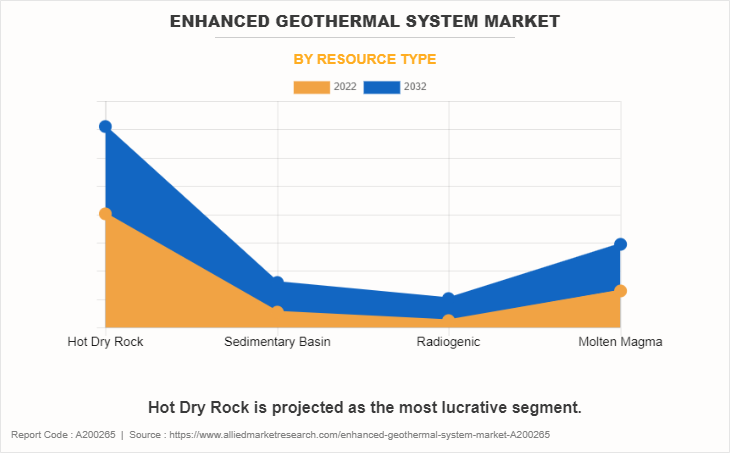
By resource type, the hot dry rock segment held the largest enhanced geothermal system market share in 2022. Enhanced Geothermal Systems (EGS) represent a promising frontier in sustainable energy production, particularly in regions with abundant hot dry rock resources. EGS technology leverages the natural heat reservoirs of the Earth by creating engineered geothermal reservoirs, opening up new avenues for clean and renewable energy. Several drivers and trends have shaped the development and adoption of EGS.
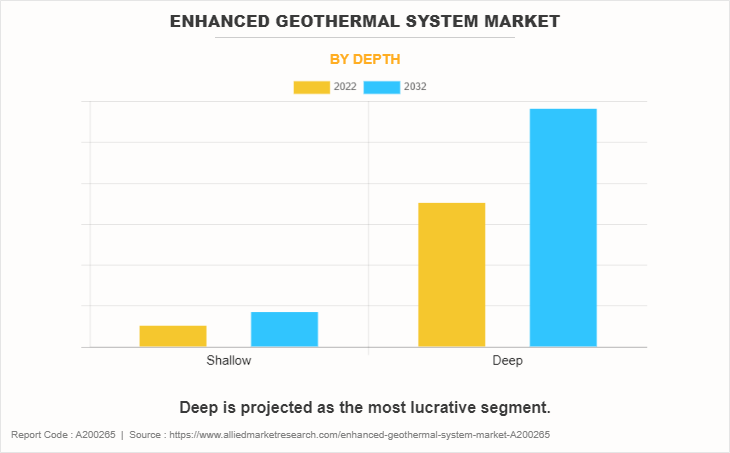
By depth, the deep segment held the largest market share in 2022. Enhanced Geothermal Systems (EGS) represent a promising frontier in the field of renewable energy, tapping into the vast reservoirs of geothermal heat of the Erath at deeper depths. First and foremost, the growth in global demand for clean and sustainable energy sources is a major driver. EGS offers a continuous and reliable source of electricity generation, unaffected by weather conditions, making it an attractive option for countries striving to reduce their carbon footprint and achieve energy security.
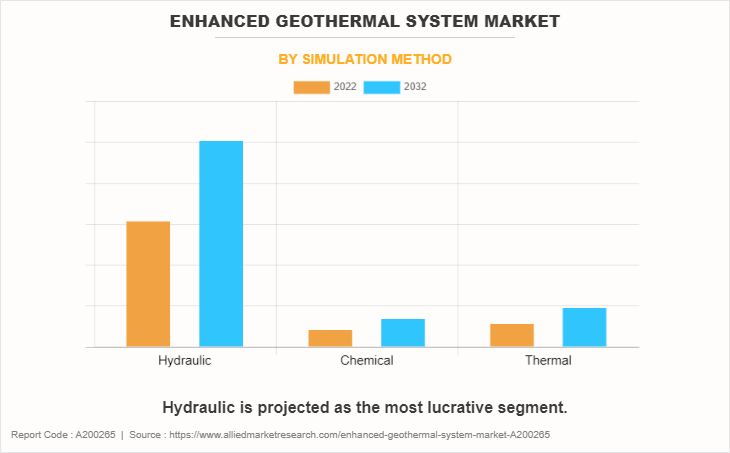
By simulation method, the hydraulic segment held the largest market share in 2022. One of the key drivers behind the adoption of hydraulic simulation in EGS is its ability to enhance reservoir characterization. Engineers and geologists may better understand the complex geological structures, permeability variations, and temperature gradients that influence the success of EGS projects by accurately modeling fluid flow within the geothermal reservoir. This improved understanding leads to more precise site selection and drilling strategies, reducing exploration risks and project costs.
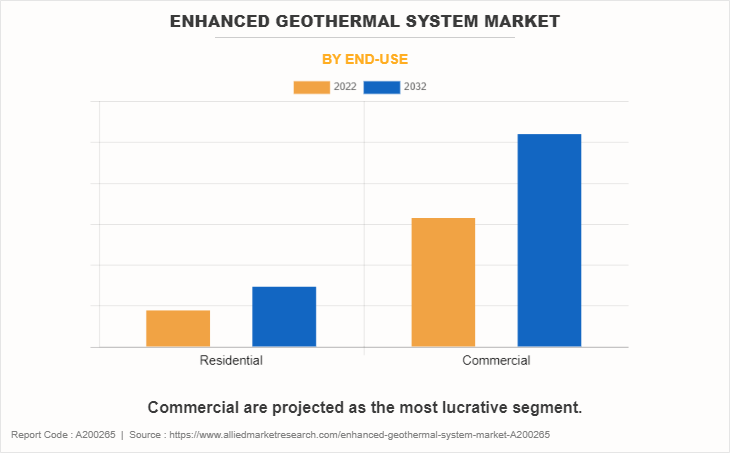
By end-use, the commercial segment held the largest market share in 2022. Enhanced Geothermal Systems (EGS) hold immense promise for the commercial sector, offering a sustainable and efficient source of clean energy. EGS presents several trends and opportunities that are poised to transform the commercial sector as the world grapples with the urgent need to reduce greenhouse gas emissions and transition towards renewable energy sources.
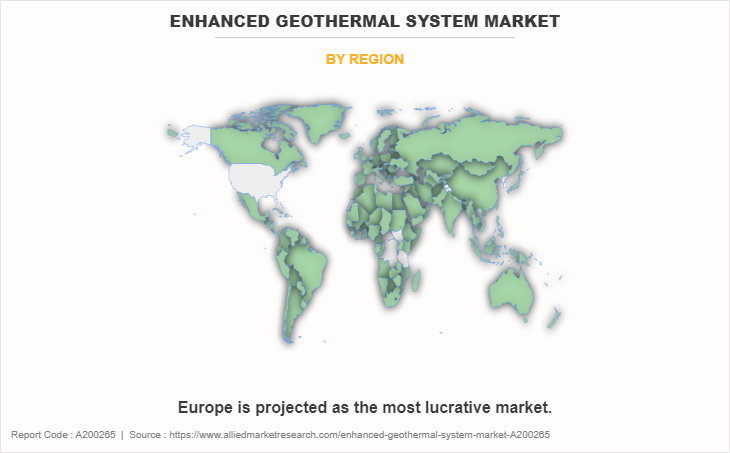
By region, the market is categorized into North America, Europe, Asia-Pacific, and LAMEA. The Europe region is one of the fastest-growing regions in the world. Enhanced geothermal systems have emerged as a promising technology in pursuit of sustainable and clean energy sources in Europe. Several driving factors have propelled the development and adoption of EGS in the region.
First, commitment of Europe to reduce carbon emissions and transition toward renewable energy sources aligns perfectly with the potential of EGS. EGS offers a reliable and consistent source of baseload power that may help replace fossil fuels in heating and electricity generation with the ambitious goals of European Union to achieve carbon neutrality by 2050.
Key developmental strategies undertaken by key players
In June 2023, Energy Development Corp. (EDC), a subsidiary of First Gen has expanded its geothermal power generation capacity in the Philippines with two prospects scheduled for drilling next year. This expansion is expected to increase the demand for geothermal energy leading to the enhanced geothermal system market growth.
In February 2023, Fuji Electric Co., Ltd. announced that Toyota Tsusho Corporation, which entered an EPC (Engineering, Procurement, and Construction) contract with QPEA GT Menengai Limited, a subsidiary of Globeleq, a British independent power producer operating and developing power projects in Africa, has granted it a contract for the supply of geothermal power facility for the Menengai Geothermal Power Station in Kenya. The aim of the project is to construct a geothermal power plant in the Menengai region, which is a potential new geothermal resource after the Olkaria region. Fuji Electric Co., Ltd. is expected to produce and supply geothermal steam turbines, generators, and other essential machinery.
In December 2022, AP Renewables Inc. (APRI), a subsidiary of Aboitiz Power Corporation, signed the Engineering, Procurement, and Construction (EPC) agreements for its 17-megawatt (MW) binary geothermal power plant Tiwi, Albay. APRI granted the EPC contracts to Ormat Technologies, Inc. and Desco, Inc., two companies that are recognized for their engineering services, power plant system designs, and expertise in the geothermal energy sector. This collaboration is projected to reinforce in providing Cleanergy to the grid. Cleanergy is renewable energy (RE) solutions brand of AboitizPower.
In November 2022, Ormat, Jieyuan Energy Development and Fengyu Green Energy signed a three-party cooperation agreement to jointly develop geothermal power plants with an installation capacity of more than 20MW in New Taipei and Yilan. In the future, drilling and power plant construction is anticipated to be carried out by Fengyu Green Energy, ORMAT will provide the technology and generator sets, and JY Energy is expected to develop and manage the operation of the power plants. This agreement is anticipated to increase the demand for geothermal energy thus boosting the growth of the market.
Key Benefits For Stakeholders
- This report provides a quantitative analysis of the market segments, current trends, estimations, and dynamics of the enhanced geothermal system market analysis from 2022 to 2032 to identify the prevailing enhanced geothermal system market opportunities.
- The market research is offered along with information related to key drivers, restraints, and opportunities.
- Porter's five forces analysis highlights the potency of buyers and suppliers to enable stakeholders make profit-oriented business decisions and strengthen their supplier-buyer network.
- In-depth analysis of the enhanced geothermal system market segmentation assists to determine the prevailing market opportunities.
- Major countries in each region are mapped according to their revenue contribution to the global market.
- Market player positioning facilitates benchmarking and provides a clear understanding of the present position of the market players.
- The report includes the analysis of the regional as well as global enhanced geothermal system market trends, key players, market segments, application areas, and market growth strategies.
Enhanced Geothermal System Market Report Highlights
| Aspects | Details |
| Market Size By 2032 | USD 3.3 billion |
| Growth Rate | CAGR of 5.2% |
| Forecast period | 2022 - 2032 |
| Report Pages | 380 |
| By End-use |
|
| By Resource Type |
|
| By Depth |
|
| By Simulation Method |
|
| By Region |
|
| Key Market Players | Ormat, First Gen, Enel Spa, TOSHIBA CORPORATION, Calpine, MITSUBISHI HEAVY INDUSTRIES, LTD., Yokogawa Electric Corporation, AltaRock Energy, Inc., Fuji Electric Co., Ltd., Aboitiz Power Corporation |
Analyst Review
An enhanced geothermal system (EGS) uses geothermal energy to generate power by heating the core of the Earth. EGS involves injecting water into hot, dry, deep rock formations beneath the crust of the Earth to build an artificial geothermal reservoir. EGS technology uses a variety of techniques, including fluid injection to improve heat exchange, efficient steam extraction, and hydraulic fracturing to produce fissures in the rock for effective water circulation. It provides a consistent and long-lasting supply of renewable energy while minimizing greenhouse gas emissions.
Surge in the demand for clean energy, rise in electricity consumption, and technological advancements drive the growth of the market. EGS is considered clean energy as it uses the heat produced by the core of the earth and does not depend on the weather conditions. Furthermore, it provides a continuous supply of electricity to satisfy the electricity demand globally. However, high investment costs and availability of alternative energy sources hampers market growth. The rise in residential and commercial construction projects presented a lucrative enhanced geothermal system market opportunity for the market. EGS have a significant impact on the construction industry as they offer a resource for heating and cooling buildings that is both affordable and beneficial to the environment.
EGS projects are exploring the concept of co-producing valuable minerals or resources alongside geothermal energy production. For example, lithium extraction from geothermal brine, which is used in batteries for electric vehicles, is gaining attention.
Commercial application are the potential customers of Enhanced Geothermal System Market industry.
Europe region will provide more business opportunities for Enhanced Geothermal System market in coming years
The market players are adopting various growth strategies and also investing in R&D extensively to develop technically advanced unique products which are expected to drive the market size.
Aboitiz Power Corporation, AltaRock Energy, Inc., Calpine Corporation, Enel Spa, First Gen, Fuji Electric Co., Ltd., Mitsubishi Heavy Industries, Ltd., Ormat, TOSHIBA CORPORATION, and Yokogawa Electric Corporation are the top players in Enhanced Geothermal System market.
Loading Table Of Content...
Loading Research Methodology...



